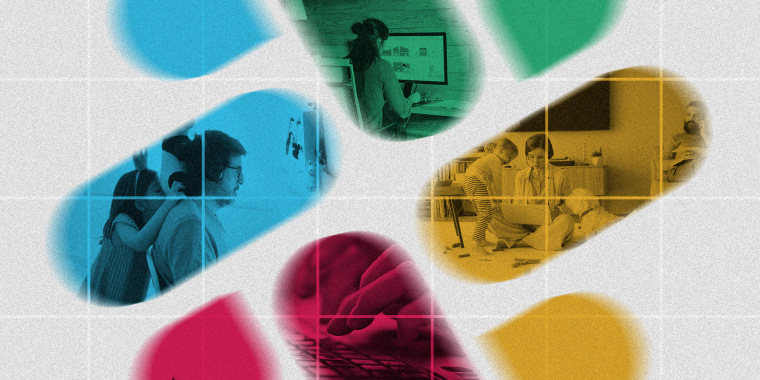I have never met my co-workers. I started this gig at MSNBC in October, approximately 215 days into the Covid-19 pandemic. In the five months since, I’ve never been in the same physical space as anyone on my team — or even my company, for that matter.
The closest I’ve come is the near-constant communication with them via Slack. The now ubiquitous messaging app rolled out a new feature on Wednesday that allows messaging between any paying Slack users, tearing down yet another remnant of office culture in the Before Times.
We’ve turned to digital workflows and with it digital camaraderie.
The last year has seen people lose work, find work and find their patterns of work completely disrupted. Recalibrating to the monotony of being in the same space day after day has been one thing; the lack of human connection, the inability to wander over to a co-worker’s desk and chat about your project or your day or the identity of the person who keeps destroying the microwave with splattered pasta sauce every week has been a whole other thing to wrap our minds around.
Instead, we’ve turned to digital workflows and with it digital camaraderie. “It feels like we are all co-workers on the internet!” one of my friends from my last job told me earlier this month, when reminded that we’d never work in the same office again. It’s true: This level of forced separation has meant that everyone who has been able to work from home is bound together through our screens in a way that feels somewhere between "Star Trek" and [insert dystopian techno-nightmare here].
It feels weirdly fitting that millennials, many of whom grew up glued to AIM and other chat services, have seen our adult working hours dominated by the now all-too-familiar sound of the Slack messaging app’s alerts. And with the advent of Slack Connect, we really are all basically office mates in one giant coworking space, for better or for worse.
For those who don’t use it and don’t get why this is a big deal, Slack has until now been an entirely walled-off set of communities. I couldn’t message my former co-workers on the platform or vice versa unless we set up an entirely new community, separate from our respective companies. Now there’s a chance this could be what finally kills off, or at least weakens, corporate email, which in 2019 ate up an average of five hours per day.
On one hand, this development feels somewhat natural for me. I spent my high school years fully absorbed in my digital life whenever I could escape. Through our internet connection — either a dial-up modem or DSL connection, depending on my family’s financial status at the time — I spent hours becoming close friends with people I’d never met. (Many of them I’ve still never met to this day; some of them became real-life friends; one of them I’m engaged to, so time well spent overall.) If anything, the fact that I have the option of seeing and interacting with my co-workers at all over Zoom is a huge step-up from the early 2000s, when you were lucky if you and your friends had working webcams available.
There’s less and less of a difference between the digital sphere and real life lately, something that goes far beyond Slack messages
On the other, the advent of Slack has been even more disruptive than when email became available on your phone. There’s an immediacy to a chat message that isn’t there with an email. An email has a built-in expectation that a response may be delayed at least some time. Chats are an ongoing conversation; it would be rude not to answer. That in turn helped erode the façade of work-life balance that we once clung to — before the pandemic struck, of course.
Breaking down those walls also has the potential to allow harassment from the outside masses. The Verge detailed how that could work, sending spiteful comments in requests to direct message another user, prompting Slack to say it would take “immediate steps to prevent this kind of abuse, beginning today with the removal of the ability to customize a message when a user invites someone to Slack Connect DMs.” BuzzFeed News documented how unfortunately easy it is to accidentally accept a professional Slack collaboration invite from a personal account — and noted how important a block option might become in the future.
There’s less and less of a difference between the digital sphere and real life lately, something that goes far beyond Slack messages. We’re all spending our days together in our online bubbles, only occasionally merging with others, encapsulated in our discrete yet porous firmaments.
The pandemic sealed us off even further. It’s going to be a bit of a shock when, eventually, we’re going to have to emerge and reconnect with physical offices. I miss spending time face to face with colleagues; I’m still not sure whether I’m ready for my bubble to pop. One day, I’ll get to meet all of them, after months of existing only as pixels on a screen. I hope they like the real-life version of me.

